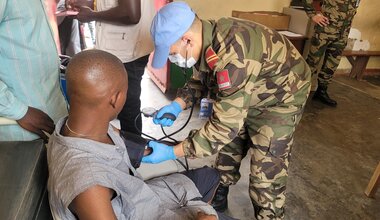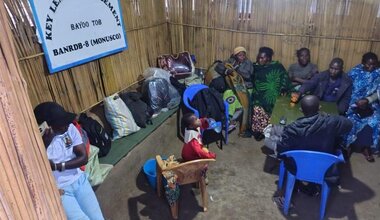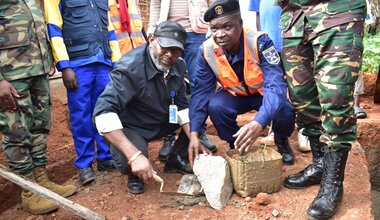Ituri: MONUSCO has trained more than 650 FARDC officers and troops in combat tactics in the jungle
From July 9 to 23, 2021, MONUSCO trained 652 officers and troops of the Armed Forces of the Democratic Republic of Congo (FARDC) as well as members of the Congolese National Police (PNC), including one woman, on military strategies around war tactics in the jungle, the handling of unexploded explosive devices and weapons shooting.
This training, which alternated between theory and practice, took place according to the modules between the military camps Rwampara and Ndoromo, 8 and 3 km from Bunia, in Ituri. It benefited from the expertise of the special units of the Brazilian and Guatemalan contingents, with support from the Bangladeshi and Nepalese contingents deployed in Ituri.

The training also helped to raise participants’ awareness of the need to respect human rights and the international humanitarian law, as well as to protect the displaced persons and combat armed conflicts-related sexual violence.
For MONUSCO, this training is part of the missions assigned to the UN Force in the DRC, in particular that of stepping up the operational capacities of the DRC security forces to enable them to better fulfill their tasks of securing and protecting civilians.
Lieutenant-Colonel Alain Mpasi Zambuta, deputy commander in charge of operations and intelligence within the 3206th FARDC regiment based in Ituri, applauded this additional contribution from MONUSCO which will enable them to better meet the challenges:
“The training was very useful and, as we say in French, repetition is the mother of science. It complements and reinforces the other training received by our troops at the Lukusa training center in Kisangani. In the current context of the state of siege; the training will allow us to have a better conduct in the field in terms of respect for international humanitarian law, but also to apply the military tactics learned in the field. We discovered some aspects we were not very familiar with until now, including combat in the jungle; now we are able and ready to apply them on the ground.”

Reducing the risk of human rights violations ...
Another objective of this training, as far as MONUSCO is concerned, was, on the one hand, to contribute to the fight against impunity; and on the other hand, to help reduce the risk of human rights violations committed by defense and security forces deployed in areas of conflict or operations.
“This activity has targeted army and police officers, because they are the ones who should show the troops under their command which red lines they must not cross during operations; and these red lines are, for example, respect for human rights and human dignity; respect for international humanitarian law… We are satisfied because they, in turn, have pledged to pass on the messages received on the ground”, declared Bertin Ory, the head of the United Nations Joint Human Rights Office in Bunia, one of the trainers.
Helping to eradicate negative forces ...
MONUSCO reiterated its commitment to provide the Congolese defense forces with the support necessary to eliminate the armed groups in Ituri, as recommended by the UN Security Council.
“MONUSCO is and will always be ready to help with any kind of training requested; we will always be ready and by your side to provide more training to improve your skills in order to allow you to destroy these negative forces who have settled on the Congolese soil. That’s why MONUSCO and the International Community are here. You are the ones who will win this battle, you are the ones who will destroy these negative forces,” declared the head of the UN Mission's peacekeepers, General Afonso Da Costa, who came especially from Goma for the occasion.
These members of the Congolese defense forces will now be deployed on the ground as part of the operations relating to the state of siege in this province where several local and foreign armed groups remain active.
 UN
UN United Nations Peacekeeping
United Nations Peacekeeping






